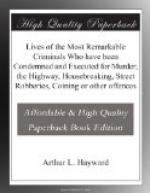Though there is not perhaps any sin so opposite to our nature as cruelty towards our fellow creatures, yet we see it so thoroughly established in some tempers, that neither education nor a sense of religion are strong enough to abate it, much less to wear it out. The person of whom we are speaking, John Jaen, was the son of parents in very good circumstances at Bristol, who they bred him up to the knowledge of everything requisite to a person who was to be bred up in trade, and he grew a very tolerable proficient as well in the knowledge of the Latin tongue, as in writing and accounts, for his improvement in all which he was put under the best masters. When he had finished that course of learning which his friends thought would qualify him for what they designed him, he was immediately put apprentice to a cooper in Bristol, where he served his time with both fidelity and industry. When it was expired, he applied himself to trade with the same diligence, and sometimes went to sea, till in the year ’24 he became master of a ship called the Burnett, fitted out by some merchants at Bristol, for South Carolina. In his return from this voyage he committed the murder for which he died.
On the 25th April, 1726, an Admiralty Sessions was held at the Old Bailey, before the Hon. Sir Henry Penrice, Judge of the High Court of Admiralty, assisted by the Honourable Mr. Baron Hale, at which Captain Greagh was indicated for feloniously sinking the good ship called the Friendship, of which he was commander; but as there appeared no grounds for such a charge, he was acquitted. Afterwards Captain John Jaen, of Bristol, was set to the bar, and arraigned on an indictment for wilfully and inhumanly murdering one Richard Pye, who had been cabin-boy, in the month of March, in the year 1724. It appeared by the evidence produced against him that he either whipped the boy himself or caused him to be whipped every day during the voyage; that he caused him to be tied to the mainmast with ropes for nine days together, extending his arms and legs to the utmost, whipping him with a cat (as it is called) of five small cords till he was all bloody, then causing his wounds to be several times washed with brine and pickle. Under this terrible usage the poor wretch grew soon after speechless. The Captain, notwithstanding, continued his cruel usage, stamping, beating and abusing him, and even obliging him to eat his own excrements, which forcing its way upwards again, the boy in his agony of pain made signs for a dram, whereupon the captain in derision took a glass, carried it into the cabin, and made water therein, and then brought it to the boy to drink, who rejected the same. The lamentable condition in which he was made no impression on the captain, who continued to treat him with the same severity, by whipping, pickling, kicking, beating, and bruising him while he lingered out his miserable life. On the last day of this he gave him eighteen




